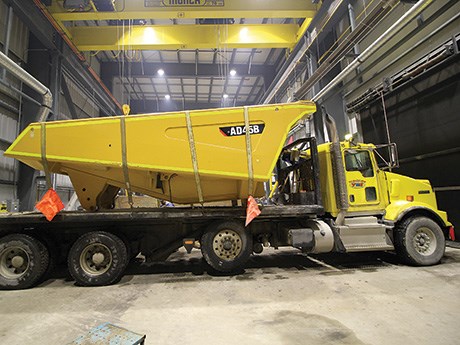Bucket Shop could use 35 welders and millwrights
A little more than a year after moving into its new state-of-the-art 65,000-square-foot production facility in Timmins, the Bucket Shop is a beehive of activity.
“We have 140 employees now, but we could use another 35 welders and millwrights,” said market development manager Jamie Pouw.
The company manufactures and refurbishes buckets for underground loaders and has a contract with Detour Gold to supply and refurbish haul truck boxes and buckets for shovels.
The shortage of job-ready skilled labour is a serious concern that has prompted the Bucket Shop to forge closer ties with Northern College and College Boreal, said Pouw. Bucket Shop management has worked with the colleges to tweak their curriculum and offers its own facilities through co-op placements and apprenticeships to upgrade their skills.
“A lab environment in a college,” said Pouw, “doesn’t necessarily replicate a workplace environment.”
Studies on predicted labour shortages confirm his concern.
“The Far Northeast Training Board did an in-depth study of the mining sector in northeastern Ontario to assess the need for skilled labour over the next 10 years, and they’re forecasting a shortage of 3,000 people.”
For Northern Ontario as a whole the Northern Policy Institute is forecasting a shortage of 50,000 people.
Mining suppliers like the Bucket Shop are optimistic about the future. Goldcorp is advancing its Borden project in Chapleau and its Century project in Timmins. There’s the possibility of a further life-of-mine extension by Glencore’s Kidd Operations, and Detour Gold, the largest open pit gold mine in Canada, operates a fleet of approximately 40 big haul trucks 300 kilometres northeast of Timmins.
At the same time, export markets are beginning to open up.
Many of the mining companies and contractors in Northern Ontario are part of large multi-national groups, so doing well in Northern Ontario creates opportunities across Canada and around the world, said Pouw.
“We have a few innovative products that we’ve designed and engineered, namely lip and heel wear parts that eliminate a lot of wear and tear on buckets. They’ve worked well for some of the local mines, so they said, ‘Let’s try it at some of our other sites.’ We shipped a bucket to Ghana, for example. What works here can work anywhere else in the world.
“Normally, you can change the lips four times before you have to refurbish the bucket, so the longer the lip lasts, the longer you can hold off refurbishing the bucket.”
The Bucket Shop’s relationship with Timmins-based Dumas Contracting has also opened doors in Chile, Mexico and Peru.
The export business is a plus, said Pouw, but “our focus is still to take care of our own backyard because it’s easier both logistically and financially.”
The Bucket Shop’s fieldwork division, Steeltec, is especially busy with work at Detour Gold where its skill building and assembling haul truck boxes recently caught the attention of Caterpillar.
The truck boxes are too big for highway transport, so they have to be shipped in parts and assembled on site.
Having sold a new fleet of haul trucks for the Baffinland iron ore operation in Canada’s Far North, Caterpillar engaged Steeltech to send a crew to the Port of Montreal to assemble and weld the boxes together for their journey north by ship to Baffin Island.
“It’s really nice when your expertise becomes world-class and you get brought around the world to support projects like this,” said Pouw.
Looking to the future though, the Bucket Shop knows that it needs the welders and millwrights to get the job done, and that more will need to be done to resolve the predicted labour shortage.


